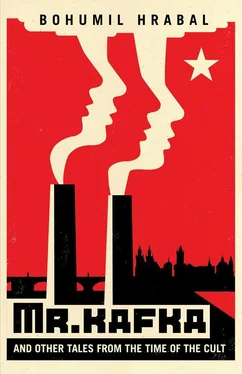“They were merely pitiable,” said the old worker. “They all had jobs somewhere in Teta or Ara that never paid enough, so they had to earn extra. .. As long as they had their youth, they got by, more or less.” He turned around, sitting on the bunk next to the fireman’s helmet and the girl’s white arms. “We saw those miserable old hags offering themselves for five-crown notes by the Těsnov station, in the park by the Deniska, or that little park at Invalidova, or outside the hospital Na Františku, or in the street outside Kučera’s or at the Old Lady… and there were columns of desperate, lonely people, dragging themselves back at night to their hostels in Kobylis, or at Krejčar’s, or at the Jewish hospice, or to the brickworks in Vysočany, and my sister would yell: ‘Something must be done for these people!’ But we did nothing. We were rich, and watched those parades from the window. And today? Today, she denies everything to my face.”
“Fine,” said Bárta, the merchant, “but some ideals are still alive, and the aristocracy still subscribes to them. They still know about getting back to the natural order of things.”
“Couldn’t agree more,” said the doctor of philosophy. “They’re the only ones who still know how to get back to the natural order of things. An English lord can get plastered and do swinish things as easily as a farmhand, but he does it among his own people, in the club. That’s why there are so many clubs in England, and why on the outside everyone’s a gentleman…”
“I meant the Czech aristocracy,” cried the merchant.
“Oh, them? As a young boy I remember Prince Šternberk would hold a hunt, and afterward, there’d be an alfresco orgy of eating and drinking. Oh God, I remember the Contessa Šternberková — how old could she have been? Twenty-two and gorgeous. But in the middle of the banquet, when the aristos were already plastered, the Contessa plants her riding boot, which she was still wearing, on the tablecloth, points her foot at one of the old degenerates, lifts her leg, and farts like an old mother bear. The barons and princes howled with laughter. Their monocles clinked, they guffawed. .. Oh, sapristi! Comme charmante! Éblouissante! And why not? The Contessa was among her own kind, and she too reverted to the natural order of things. The next day, when she went to church in her coach, she was the perfect Contessa again, with her little nose in the air, which to this day still gives me a vision of the infinite… and I knelt by her carriage, and she acknowledged my presence with a slight wave of her handkerchief.”
As he was speaking, they went on unloading rusty pipe clamps, glass-cutting shears, boxes of soldering flux, carbon brushes for electric motors, a small metal-shaping anvil, a pewter soldering iron, and then, together, they lifted out heavy iron wheels, lateral-toothed cog wheels, camshafts, roller bearings, connecting rods, clutch plates and driveshafts.
“All right then, what’s left? What?” asked the merchant, shaking both hands over his head.
Karel, the fireman, rolled over on his side, caught his breath, and stood up. He straightened his collar in the mirror and cocked his helmet at a rakish angle. It shone like a monstrance.
“Not that great,” he said, nodding toward the bunk. “She’s like a dead fish. I should have set fire to her hair. It would have gone up like straw.”
“But what about the shop girls these days working in the Pearl or the White Swan and those other places? Don’t they have to earn extra?… Are they making enough?” asked the Prince. His boot finally popped free, and he fell backward like a rocking chair, his boot in his hand. “Go to the Curio Bar, or the Baroque… office girls go there to earn a little extra, maybe help their friends pay the rent — isn’t that so?”
“That’s a fact,” said the old worker with deep circles under his eyes, “but believe me, those girls are to be pitied. This one here is contemptible. If they find her here tomorrow, Prince, you’ll have the cops all over you and they’ll pop you back inside, no more suspended sentence… but Marion, what do the stars say?” The old worker walked back to the table, poured himself another glass of cheap wine, and resumed his observation of the red reflection scampering around the tabletop like a piglet on the run.
“What’s left?” asked the doctor, and he paused thoughtfully, looking at the four streams of cold water drenching the blast furnace wall. He looked at the workers high up on the furnace, dismantling the elbow joint of one of the cooling pipes that encircled the furnace walls and conveyed cold water that was gravity-fed from the cement cistern high above the steel works to the pipes around the blast furnaces. As the streams of water from the fire hoses doused the furnace, two workers suspended in slings finished taking apart the joint.
“I’ll tell you what. I believe in people who are capable of wrestling with their fate,” the doctor of philosophy said bitterly. “For me, there’s nothing greater than that because ignorance — not knowing — reigns in my field too. The moment a philosopher comes up with a rational explanation of the universe, or of himself, he turns his back on it… Lao Tzu: the art of not knowing; Socrates: I know that I know nothing; Erasmus of Rotterdam: In praise of folly. Nicolas of Cusa: Docta ignorantia , learned ignorance. And what has our precious twentieth century given us? The revolt of the masses! And in art? We’re happily regressing to the time of the Flood.”
So said the doctor and, with disgust, he flung the objects he’d removed from the wagon into the hopper: farmers’ shears, a small hammer, sewing clamps, leather-working tools, a baking oven, a hot water tank from a woodstove, stove plates, a hemp comb…
“I don’t want nothing to do with it,” said the fireman, “and if something comes of it, I’m certifiably crazy and I’ve got the papers to prove it.”
The Prince held his head and rubbed his temples. “Well, let’s toss her out,” he said, and he stood up and shook the sleeping figure, rolling her over on her back.
“Let’s hope she don’t croak on us,” the fireman added, but then he caught sight of himself in the mirror and was thrilled to see how marvelously his uniform suited him.
“Young lady, the fun’s over,” said the Prince, and he shook the sleeping girl again.
She slumped headfirst off the bunk: first her torso, her beautiful hair sweeping the floor, followed by her two naked legs, like two white fish.
“Then can we at least discuss prostitutes?” the merchant asked desperately.
“Now you’re talking!” the doctor of philosophy said, holding up his gloves. “If only there were any left. Go into any nightclub these days, my friend, and you’ll feel like weeping. You have to drink some watered-down concoction with a feeble-minded bimbo who doesn’t know her assets from her deficits. She can’t play the piano, doesn’t know what conversation or good fun is. Ah, but when we were part of Austria? The whores at Goldschmidt’s, now they were real ladies! I had an assignation with one of them in Stromovka Park, at the Rosebush, and she showed up in a carriage like a countess. Or take the whores at the Napoleon, or, Christ Jesus! at Šuhů’s, where three florins would get you a decent look at those buxom pieces of ass — but just a look, no alcohol — three florins, and then the Schwantzmutter would say: ‘Goodbye, young man, we’d love to have you back again, anytime.’ But that we were part of Austria then. After the war, of course, prostitution was beneath a woman’s dignity. It was all because of that suffragette bitch Plamínková and Masaryk’s sainted daughter, Alice; her most of all. Some army major gave her a bad fuck, or maybe he spurned her, so now the whole world can go without. And from then on, it’s been the twilight of humanity. .. Jesus!” The doctor of philosophy stood up. He watched as the yard engine approached to take away the loaded hoppers, and he saw the jets of water that had been dousing the blast furnace subside. “One of the whores at Šuhů’s,” he went on. “Sweet Jesus! When she’d go for a stroll along the Ferdinand Allee, she was something to see, a regular freak of nature, statuesque, relaxed, a kind of Ur-woman she was, and no one could help turning and looking. What was manly in the men would stick out like a bicycle pump… a woman like that was the absolute spirit of the earth, to put it in Hegelian terms.”
Читать дальше












